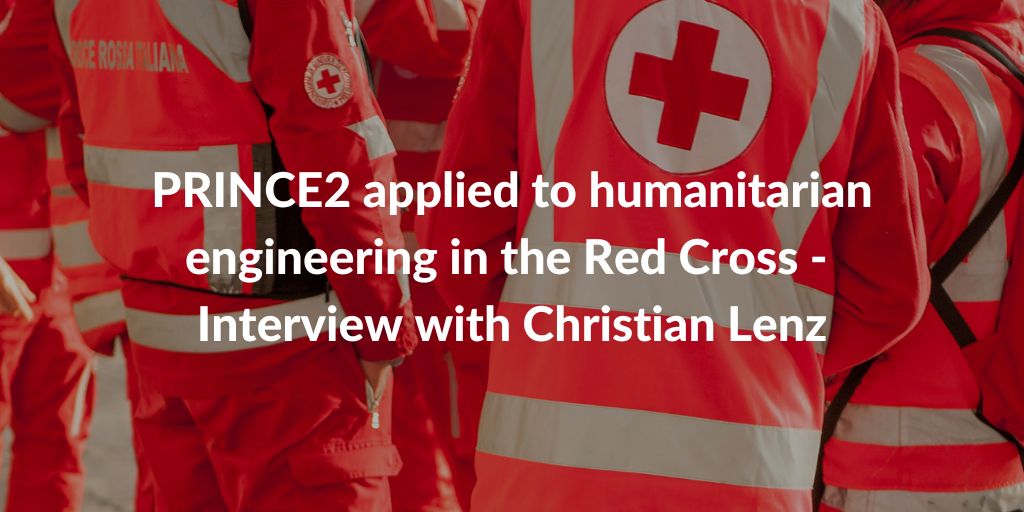Categories
Tags
Newsletter
Subscribe to the QRP International neswletter and get all the news on trends, useful contents and invitations to our upcoming events
Subscribe
Christian Lenz is Water and Habitat Coordinator for Lebanon at the International Committee of the Red Cross (#ICRC). In our last interview, he tells us how PRINCE2 supports him in his work.
What’s your current job title? What do you actually do?
My current job title is “Water and Habitat Coordinator for Lebanon” with the International Committee of the Red Cross (ICRC). In this role I act as the Head of Engineering for the ICRC in Lebanon. I oversee all humanitarian engineering activities the ICRC carries out by a team of about 20 engineers in the country with the aim of creating or maintaining sustainable living environments.
Can you give us an example of a humanitarian project you recently took part in?
Within its mandate based on the Geneva Conventions, the ICRC carries out a large variety of humanitarian projects in support of both host and refugee communities in Lebanon. In the field of engineering, we are focusing mostly on public health engineering, motivated by the desire to restore or maintain access to essential services such as water, wastewater, electricity, or healthcare. Our activities range from basic projects such as the installation of simple latrines and water tanks in Syrian refugee camps to complex projects to reduce water losses in big urban water supply systems such as in Tripoli City. We are also working in support of the country’s two largest hospitals, aiming to support quality healthcare services sustained by well-working and adequate infrastructure.
What are the main challenges in your job?
The main challenges we face in Lebanon are the dire economic crisis and its multi-dimensional impact on people’s lives as well as essential infrastructure. The most vulnerable populations are no longer able to cover financially their basic needs such as water, food, or rent. Due to the economic crisis many people, former middle class, can no longer afford to cover their families’ living expenses. Utilities providing essential services such as water, electricity, or healthcare are no longer able to cover for their operation & maintenance cost. For example, the real value of the salary of a water pumping station operator today is about 40 USD monthly; not enough to buy food for the month or to drive the car every day to work.
The main challenge is to identify the best way to provide the ICRC’s humanitarian services in line with the organization’s mandate, addressing the most pressing needs in the most efficient way possible, while keeping an eye on the longer-term impact and eventually recovery from the crisis.
How do you think the PRINCE2 method can support you in your role?
There are both direct benefits of understanding the PRINCE2 methodology as well as indirect ones.
PRINCE2 is the project management of choice for large institutional projects at headquarters’ level and generally quite common in the humanitarian sector; somewhat the ‘industry standard’ for project management. A solid understanding of PRINCE2 allows me both to contribute as an informed project team member as well as to follow larger initiatives with good understanding when not directly involved myself.
For projects implemented in the field, PRINCE2 is not always directly applicable but must be (often strongly) tailored to the largely variable contexts. However, having this methodology as a solid foundation allows me to coach colleagues when framing projects, ‘encapsulating’ them as planned activities first, but also guide these activities throughout implementation later. As our work is often of very multi-disciplinary nature, we must ensure that all colleagues are on board and able to contribute to successful activities. This does not always come naturally and a good understanding of PRINCE2 allows to analyse deviations from ideal, frame roles and responsibilities, ensure good information flow, and ultimately lead motivated project teams.
What are three things you’ve told yourself that you would like to learn in the next future to develop you as a professional?
Having recently successfully completed an Executive master’s in Business Administration, the PRINCE2 Practitioner, and the PROSCI Change Practitioner, I see next a phase of consolidation of this newly gained knowledge, trying to translate it into tangible activities and know-how learned on the job.
In my upcoming role at headquarters, I will be overseeing engineering activities in the Near and Middle East (NAME) region for the ICRC. New need to study further will emerge very soon. Humanitarian needs in the NAME region are enormous, mostly linked to (extreme) water scarcity, exacerbated by the effects of protracted conflicts. The lack of access to safe drinking water results in grave hazards to public health such as the cholera epidemic in Yemen. Humanitarian organizations are unable to address this challenge alone and innovative partnerships both with development organizations as well as the private sector are necessary to keep protecting public health of conflict affected communities.
To being able to engage effectively with partners to address such problems, I will have to pursue further studies in order to establish common ground that allows to develop long-term and complex projects. The World Bank Environmental and Social Framework (ESF) or innovative financing models for humanitarian action creating true value-add for people affected by conflict could be such fields. It could also be necessary to gain deeper understanding of innovative business models attracting the private sector to invest in extremely unstable settings, connecting the dots between many different elements of the Sustainable Development Goals (SDG) beyond the scope of ‘traditional’ humanitarian aid, particularly to make climate change action a more integral part of humanitarian action. There is also huge room to improve the way aid is delivered, particularly when it comes to the involvement of local actors. The topics I will study in the near future will likely evolve around these elements.